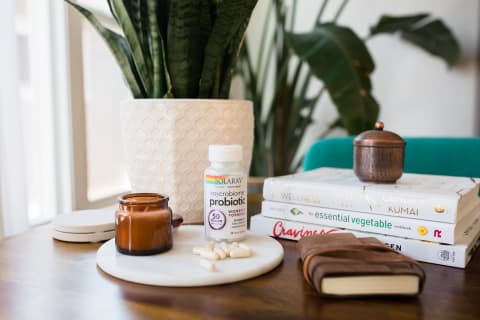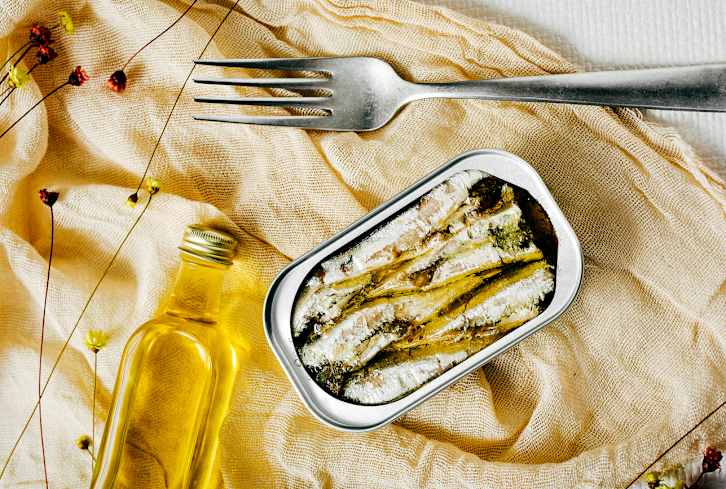Advertisement
Fermented Foods Vs. Probiotic Supplements: Here’s What Two RDs Say

Almost every day, we hear questions like: What exactly do probiotic pills do? How long do I need to take them? Can't I get probiotics from food?
We get it. These live microorganisms are confusing, partly because we've been told bacteria is inherently bad. Of course, this couldn't be further from the truth. There is an emerging body of research that suggests probiotics may be beneficial for supporting the microbiome, which is involved with everything from GI disorders to mood symptoms related to stress and anxiety. Below, we'll give you the full scoop on probiotics and whether or not they're right for you:
A probiotic supplement isn't a replacement for probiotic foods.
Supplementing with probiotics can offer a wide range of health benefits, but they shouldn't be a replacement for eating probiotic-rich foods. Incorporating fermented foods like yogurt, kefir, aged cheeses, kombucha, kimchi, miso, tempeh, and sauerkraut will help boost your intake of probiotics.
These foods provide a number of different nutrients, antioxidants, fiber, and more. Just to put things into perspective, just 4 ounces of yogurt can provide up to 10 billion CFUs (colony-forming units of bacteria), similar to a typical probiotic supplement. Eight ounces of kefir can provide 7 to 10 billion CFUs, and one serving of sauerkraut may contain up to 28 unique bacterial strains.1
Prebiotics are the food probiotics need to thrive.
Aside from eating those probiotic-rich foods, also aim to eat plenty of prebiotic foods, which will help that beneficial bacteria thrive. Prebiotics are natural, nondigestible food components that are linked to promoting the growth of beneficial bacteria in the gut. Where can you get them from? Think whole foods like onions, garlic, leeks, asparagus, artichokes, soybeans, and whole grain foods.
The great thing about fermented vegetables is that you get both the pre- and probiotic combination in one! You can make your own at home or purchase at your local market. Make sure you purchase a brand that doesn't pasteurize the vegetables because it may kill off the probiotics. Usually, good-quality fermented products are refrigerated.

Choosing the right probiotic for you is key.
We recommend asking yourself, "Why am I taking a probiotic?" Probiotic supplements contain one or more strains of beneficial bacteria, and different strains have different benefits. There are strains that are useful for people with IBS, just like there are strains that are helpful for women with urogenital issues2.
If you're going to invest in a quality product, you want to make sure that it's going to do what you want it to do. Aim for a probiotic that lists all strains and is transparent about function and ingredients. For example, Solaray's Mycrobiome® Probiotic line offers probiotics that are specially formulated for women's health. They also have a men's health line and a colon formula, for people who want to support their gut function. If you have an immune-related condition, consult with your doctor before taking probiotics.
The effects of probiotic supplementation are no longer detectable one to four weeks after individuals stop supplementing.
Consistency and lifestyle matters.
If you decide to take a probiotic, make sure you're taking it as directed and that you're taking it consistently. Research has suggested that the effects of probiotic supplementation are no longer detectable one to four weeks after individuals stop supplementing with probiotics. And this really ties into the importance of adopting a lifestyle approach when talking about gut health.
Choosing to take a probiotic supplement isn't a quick fix. It's something that you do consistently while also looking at the big picture. Making sure that you have healthy ways of coping with stress, that you're sleeping seven to nine hours a night, limiting alcohol consumption, and eating a balanced diet; these are all great ways to make sure that the probiotics you consume do their job well.
Lastly, if you're confused about which probiotic to take, we recommend using helpful resources like the US Probiotic Guide. This website sorts through the research and helps you identify which specific probiotic brands may be able to help with your particular health concern. Remember, the health benefits associated with probiotics are strain-specific, and not all strains have research backing their usefulness. As always, make sure to consult with a medical provider or dietitian familiar with probiotics before starting any new supplement regimen.



















